Fuel Life Matters
Have you checked your's lately?
THERE IS NEVER A GOOD TIME FOR FUEL CONTAMINATION
Mission-Critical Aviation Fuel
With microbial contamination, it’s not a matter of IF, it’s a matter of WHEN. Regular monitoring of microbial counts in stored fuel and tanks is essential for making the right decisions on taking action to prevent problems. Second Generation ATP testing, and full-up Next Generation DNA Sequencing (NGS) allows you to discover things that you never could before.
With microbial contamination, it’s not a matter of IF, it’s a matter of WHEN. Regular monitoring of microbial counts in stored fuel and tanks is essential for making the right decisions on taking action to prevent problems. Second Generation ATP testing, and full-up Next Generation DNA Sequencing (NGS) allows you to discover things that you never could before.
Microbial Testing Services – the MBX Advantage
Aviation fuel is sometimes incorrectly assumed to be cleaner and more sterile than the fuels used in on-road or backup application. Yet, microbiological growth can occur at any stage in the jet fuel supply chain. In its life, jet fuel has multiple points of exposure to microbial growth risks. For aviation use, the consequences of these problems developing are unusually serious.
All along the aviation fuel supply chain, every stakeholder needs to remain aware of the potential and the risks that microbial contamination plays for aviation fuel – both its risks to aviation fuel quality and to aircraft operations and safety.
Microbiological contamination threatens everyone in the broader aviation sector: commercial airlines, private aviation operators, military personnel, airports large and small, MROs, FBOs, and aviation fuel suppliers.
Relevant industry associations like JIG and IATA do encourage a more pro-active approach towards how to manage this problem. Such approaches include preventing water accumulation in tanks – an essential aspect that goes a long way towards minimizing the potential for contamination.
At the same time, there have been changes in the industry towards the options that are available – and not changes for the better. These have only increased the importance of the other key preventive steps all aviation stakeholders need to adopt. Not just water prevention but also microbiological testing of the fuel.
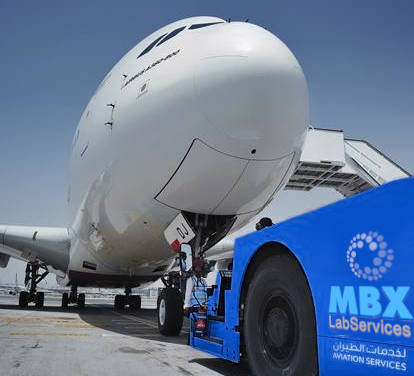
Condition Monitoring
Gone are the days when taking care of stored fuel meant just ‘fill-it and forget it’.
MBX Lab Services can make things very easy for you. By providing complete onsite testing services using the industry leading test tools and equipment, you can be sure that you are getting the right information to make the right decisions quickly. We can also provide advanced laboratory analysis services as needed in order to isolate problems in your entire fuel chain.
Specifically concerning microbial contamination, today’s fuels are susceptible like never before due primarily to changes in the refining process as well as new government regulations.
ASTM Standard 7687
The latest fuel test methodology is also known as ASTM D7687 “Standard Test Method for Measurement of Cellular Adenosine Triphosphate (ATP) in Fuel and Fuel-associated Water with Sample Concentration by Filtration”. There’s a reason why “best practices” and “ASTM” are inseparably linked. No matter what you need to know about your stored fuel, there’s a good chance you’ll need an ASTM test to get you there.
Testing Services Specifically for Aviation Applications
The principle is simple but the technology is advanced. Fuel or water samples are prepared using specialized ATP-By-Filtration reagents, which extracts the ATP from any microbes contained therein. The prepared sample is then combined with a test enzyme and inserted into our LuminUltra ATP analyzer. A chemical reaction initiated when ATP comes in contact with the enzyme produces bio-luminescent light, which is then measured by the analyzer. The amount of light produced directly indicates the amount of microbial ATP in the sample, which directly correlates with the amount of microbial content present in the sample.
The ATP-By-Filtration test method used exclusively by the latest generation test-kit manufacturers, so we use them too!
1.The tests themselves only take about 5-10 minutes to do. This allows for real time decisions – a big plus for the aviation industry where decisions may need to be made on how to service planes or whether a plane’s fuel is satisfactory or not.
2. Our test results are fully quantitative – they don’t rely on ranges or pass-fails for their results. Instead, you get numerical data that allows you to see much more clearly what is going on in your system – thereby allowing you to take action BEFORE there is a problem.
3.It detects all microbes present in the sample, without relying on the vagaries of re-growing microbial populations (as with culture tests).
The easiest and most convenient way to do ATP-By-Filtration testing is to take advantage of MBX’s Onsite Testing Services. We have a network of professional partners worldwide and can do everything for you. If you prefer to do the testing yourself, but need guidance, or secondary advanced testing, we can certainly assist with this too via our Global Partner Network.
We also offer mail-in laboratory services that use our all-inclusive Sample Collection & Ship kit. You can collect the samples, then we schedule pickup from your location, and then we do the rest – including detailed analysis and reports within days – depending on the laboratory services you want.
If you prefer to do all of the testing yourself at your site directly… no problem!
While we do sell testing products directly, we do work directly with many equipment and kit manufacturers. We know which tools will work best for what you are trying to do – and also which tools are better than the others!
Also, since we are not directly affiliated with any particular manufacturer, we are free to use (and can recommend) THE best tools for the job – rather than offering only what we have.
Give us a call to discuss – a short amount of time can save you a huge amount of (wasted) money and headaches.
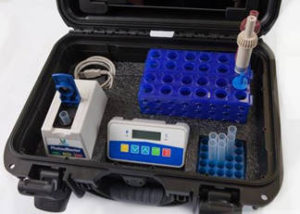
For Example: The LuminUltra 2nd-Generation ATP Analyzer System Includes everything that is needed for fast, reliable test-results on-sight in only minutes!
Make sure that your supplier includes everything and that there are no ‘hidden’ or missing components.
Contact MBX for more information if you are not sure.
The latest second-generation ATP test systems utilize a highly effective ‘Filtration’ technique. This technique has been shown to more effectively isolate microbial content, and provide quick & reliable test results onsight. LuminUltra Technologies is a world leader in the design & production of a wide variety of second-generation ATP test kits & tools – including those for use in aviation fuel applications. With their suite of tools we are able to cover all of our (and your) testing services needs.
Further, if problems are discovered, our support for you does not stop there. Our direct access to the LuminUltra microbiology & support teams, as well as having access to their advanced in-house laboratories, we are able to offer advanced test & analytical services to drill-down into the exact cause of your problem, and then make accurate recommendations to solve the problem.
Common Fuel Problems for Aircraft
In any system, you are most likely to find microbes living on physical surfaces (like tank walls) and at interfaces between fuel and free water. When on surfaces, microbes live in and behind biofilm formations – slimy growths that house entire living ecosystems of microbes. It is this slimy growth that may also turn into particulate that is suspended in fuel and blocks filters.
Microbes are a primary causal factor in instances of “MIC” – microbially induced corrosion. They do this by a variety of mechanisms – some simple, some more complex. Aluminum structures in aircraft wings become corroded through the action of acids produced by microbes that live in these biofilm formations.
MIC damage in aircraft and aviation systems can be recognized by signs of pitting or etching on surfaces. It may also develop at a surprisingly fast rate. So monitoring is an essential element of staying ahead of this problem. Yet, metal structures in aircraft aren’t so easily accessible
Central to the proper functioning of any aircraft is the Fuel Quantity Indicator System (FQIS), the series of fuel tank probes that provide fuel measurements to the cockpit through the plane’s centralized monitoring system. These probes have proven to be susceptible to fouling by microbial growth in the fuel tank.
How? Microbial growth can foul the probes that provide the readings necessary for the system to correctly read the tank’s fuel level. More specifically, this growth interferes with the capacitance measurements the system interprets. If the FQIS can’t read things properly, it will return an incorrect reading to the cockpit or even a false indication of bad fuel quantity.
That’s why it’s so important to monitor the microbiological contamination levels of the fuel itself, through regular fuel testing as with ATP-By-Filtration. The industry itself seems to concur – IATA recommends routine microbial testing, as do the AMMs for many leading aircraft manufacturers – Airbus, Boeing, Gulfstream, and others, both noncommercial and commercial.
That’s why it’s so important to monitor the microbiological contamination levels of the fuel itself, through regular fuel testing as with ATP-By-Filtration. The industry itself seems to concur – IATA recommends routine microbial testing, as do the AMMs for many leading aircraft manufacturers – Airbus, Boeing, Gulfstream, and others, both noncommercial and commercial.
FUEL STORAGE
Microbiological contamination of aviation fuel, especially stored aviation fuel, is an increasingly serious issue. Not only can it compromise the quality of the fuel, it can seriously damage tanks and systems – especially if it’s left unchecked for long enough that MIC (microbially influenced corrosion) develops.
The best practices for keeping stored aviation fuel healthy intersects with many of the recommendations for preserving over-the-road fuel, but with a handful of key exceptions. Monitoring water levels and removal of free water is a universal recommendation. But the options for administering certain kinds of fuel preservation treatments are a lot more limited for aviation fuel.
Precisely because of the limited options to solve microbial growth in aviation fuel, microbial testing of stored aviation fuel becomes a higher priority. Once a microbial problem is detected in an aviation storage tank, the microbial population is likely well established enough to require expensive remediation efforts – especially when the normal first option in the regiment, biocide, has such few options in aviation.
The most important thing is to monitor microbial populations in aviation storage tanks, giving you the ability to take action before they increase to the point where biomass, and corrosion damage develop. This is one of the value propositions of ATP-By-Filtration testing. It delivers accurate in-field microbial readings in less than 10 minutes, allowing aviation decision makers to make the right real-time decisions for their systems.
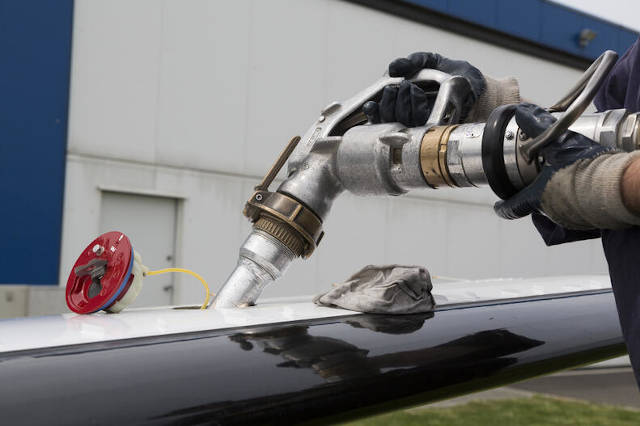
FULL SERVICE ONSITE TESTING AVAILABLE
When Uncertainty is NOT an Option
If fuel testing is not your specialty, and you would prefer to have our experienced Service Group come to you for onsite-testing, site evaluation, or testing recommendations, just give us a call. We provide these services to many clients worldwide, and are happy to assist.
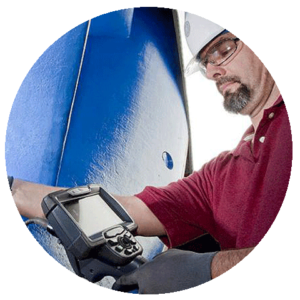
Related Articles
Aside from the obvious reasons to keep your aircraft fuel systems in premium condition, there are many other things that could be going wrong and are not so obvious…
Important Microbial
Fuel-Testing in Aviation
Bell Performance
Mission Critical: If you have a problem, the last thing you need is someone who doesn’t have your best interests in mind. The same thing goes for your backup fuel protection…
Hospitals Know the Value of Fuel-Supply Protection
Bell Performance
Checkout the awesome webinars from our partners at LuminUltra. All Webinars are posted online and can be viewed whenever you want, and of course…FREE!
WEBINARS by LuminUltra
Learn from the Wizards
Certified Products & Certified Partners
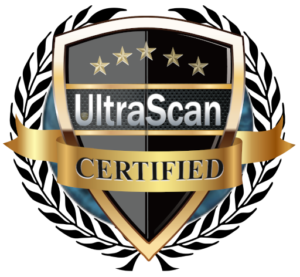
LuminUltra Technologies, as well as all of our other Partners, Suppliers, and direct services that we provide, are always aligned with the UltraScan.org Best-Practices & Standards.
This growing consortium of industry professionals is quickly becoming the world-standard and go-to place for all things relating to bacterial, microbial, and viral testing in environments, and beyond.
MBX Lab Services is a Platinum Member and contributor to this consortium.
All of our Product Partners and our Service Partners are always aligned with the UltraScan.org Best-Practices & Standards publications.
This growing consortium of industry professionals is quickly becoming the world-standard and go-to place for all things relating to bacterial, microbial, and viral testing in environments, and beyond.
MBX Lab Services is a Platinum Member and contributor to this consortium.
- Test-Plans & Protocol Standards
- Worldwide Registered Partners & Products
- COVID19 Certified-Safe Tested Places & Vaccination Database Provider
- Test-Plans & Protocol Standards
- Worldwide Registered Partners & Products
- COVID19 Certified-Safe Tested Places & Vaccination Database Provider




